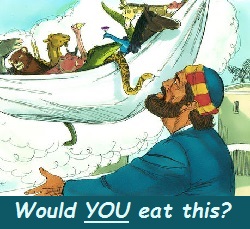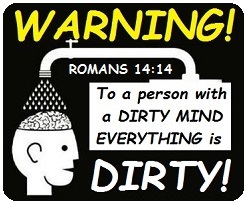 Become a Tsiyon Partner!
Become a Tsiyon Partner!
-
Free Tsiyon members can become Tsiyon Partners by signing up at any level of
support, even the lowest level, to gain access to all of our live meetings
and video recordings of same. Choose your Tsiyon Partner level here:
https://tsiyon.net/membership-options/ . Also, you can choose
a Tsiyon Partner level
using a
button in the footer of any page at the
Tsiyon.Net site.
****************************************
From Eliyahu
Consider this:
 In
Acts Chapter 10 we have the story of the first Gentile convert, the Roman
Centurion Cornelius, being saved along with his household through faith in
Yeshua the Messiah. Upon being immersed by Peter he and his household were
all filled with the Holy Spirit the same as Jewish believers had been,
signifying acceptance into the Household of Elohim through Messiah. This
probably never would have happened if the Lord Himself had not intervened,
supernaturally sending Peter to the home of the Gentile. Up until then, Jews
could not accept Gentiles into fellowship unless they were ritually
circumcised as proselytes. This was such a constant feature of Jewish
custom, based on Scripture as understood at the time, that the very idea of
accepting an uncircumcised Gentile into fellowship was shocking to Jewish
sensibilities. In Acts Chapter 11 (which we are discussing tonight at our
online Tsiyon meeting) we have the story of Peter being grilled by his
Jewish Messianic brethren in Jerusalem, being required to explain his
involvement in the reported shocking events! Much of the story of Acts 10 is
repeated again in Peter's defense of himself in Acts 11, as if a second
witness was necessary to be recorded for these events to be believed by the
Jewish recipients of the Acts account - it was that big an issue for the
first community of Jewish Messianic believers.
In
Acts Chapter 10 we have the story of the first Gentile convert, the Roman
Centurion Cornelius, being saved along with his household through faith in
Yeshua the Messiah. Upon being immersed by Peter he and his household were
all filled with the Holy Spirit the same as Jewish believers had been,
signifying acceptance into the Household of Elohim through Messiah. This
probably never would have happened if the Lord Himself had not intervened,
supernaturally sending Peter to the home of the Gentile. Up until then, Jews
could not accept Gentiles into fellowship unless they were ritually
circumcised as proselytes. This was such a constant feature of Jewish
custom, based on Scripture as understood at the time, that the very idea of
accepting an uncircumcised Gentile into fellowship was shocking to Jewish
sensibilities. In Acts Chapter 11 (which we are discussing tonight at our
online Tsiyon meeting) we have the story of Peter being grilled by his
Jewish Messianic brethren in Jerusalem, being required to explain his
involvement in the reported shocking events! Much of the story of Acts 10 is
repeated again in Peter's defense of himself in Acts 11, as if a second
witness was necessary to be recorded for these events to be believed by the
Jewish recipients of the Acts account - it was that big an issue for the
first community of Jewish Messianic believers.
 Actually,
it had been that big an issue for Peter. It had taken nothing less than a
vision from heaven of every unclean sort of beast, accompanied by an order
to kill and eat these unclean things, the vision repeated no less than three
times, to open up Peter's mind enough to receive Messiahs supernatural
directive to take the Good News to the Gentile Cornelius and his Household.
By this supernatural means Messiah propelled the Good News eventually to
Antioch, and from there to the entire Mediterranean world, and beyond.
Actually,
it had been that big an issue for Peter. It had taken nothing less than a
vision from heaven of every unclean sort of beast, accompanied by an order
to kill and eat these unclean things, the vision repeated no less than three
times, to open up Peter's mind enough to receive Messiahs supernatural
directive to take the Good News to the Gentile Cornelius and his Household.
By this supernatural means Messiah propelled the Good News eventually to
Antioch, and from there to the entire Mediterranean world, and beyond.
Its interesting that
Scriptural questions about this incident still abound. One area of
disagreement for some has to do with the Biblical food commandments of the
Torah. Did Peters vision mean that those food commandments do not apply
anymore? Our Scripture Presentation in the archive at
https://tsiyon.net/2020-11-07-sabbath-meeting/
deals with that. However, not all who heard
that agreed. One comment included a number of verses people often point to
which they say essentially cancels the food commandments. I appreciate this
comment with its list of verses. Since we are now going into this same story
of Peters vision again, it seemed to me that others might like to see these
verses, along with the point of view of the Jewish New Testament
Commentary offering a Jewish Messianic point of view. For the record,
I'm not 100% in agreement with either position, but I think comparing these
two ways of thinking helps to shed some light on the sincere controversy
involved. I will also offer some thoughts of my own.
Now, the first verse:
For every creature of God is good, and nothing to be refused, if it be
received with thanksgiving: For it is sanctified by the word of God and
prayer. 1 Timothy 4: 4-5. KJV
 The
term every creature used in the KJV is suggestive of meats. However,
other versions show a broader thought, as in these translations:
everything created by God is good (NASB) everything created by
God is good (CJB) all things created by God are good (Lamsa) etc.
Everything created by God is good, but do you want to eat motor oil,
glass shards, or hemlock? That's the point here:
The
term every creature used in the KJV is suggestive of meats. However,
other versions show a broader thought, as in these translations:
everything created by God is good (NASB) everything created by
God is good (CJB) all things created by God are good (Lamsa) etc.
Everything created by God is good, but do you want to eat motor oil,
glass shards, or hemlock? That's the point here:
Everything created by God
is good, but not everything created by God is food. Therefore,
this verse does not abolish the Jewish dietary laws.
Jewish New Testament
Commentary
Context is always important.
In our next passage Yeshua is addressing those who make the word of God
of none effect through your tradition (vs 13) - He is correcting
traditions of men, not commandments of God. He says:
There is nothing from
without a man, that entering into him can defile him: but the things
which come out of him, those are they that defile the man. If any man
have ears to hear, let him hear. And when he was entered into the house
from the people, his disciples asked him concerning the parable. And he
saith unto them, Are ye so without understanding also? Do ye not
perceive, that whatsoever thing from without entereth into the man, it
cannot defile him; Because it entereth not into his heart, but into the
belly, and goeth out into the draught, purging all meats? Mark
7:15-19 KJV
Here in Mark 7, Yeshua is
addressing religious customs that supposedly make you a clean person by
virtue of the food you eat. Yeshua points out how ridicules that is, since
everything ends up in the sewer anyway. Your food has no effect on your
heart, in the sense of making you a better person. The food commandments of
the Torah do not purport to make you a better person. Those commandments are
practical, given to maximize your health and lifespan. There is no penalty
given in the Torah for ignoring the food laws, since ignoring them carries
penalty enough, in terms of health problems and potentially shortened life
span. Your choice.
 Here
is a verse some apply to the food laws:
Here
is a verse some apply to the food laws:
I know, and am persuaded
by the Lord Jesus, that there is nothing unclean of itself: but to him
that esteemeth any thing to be unclean, to him it is unclean. Romans
14:14 KJV
OK, this is one of those
things Paul says that must be taken with some discretion. Nothing
unclean? How about sin? Is sin unclean? How about rotting, maggot-infested
slop? Is that unclean? Why do you take a shower if nothing, including you,
is unclean? Sometimes Paul (and others) overstate a point to make a larger
point. The point here is that if you have a dirty mind then you will have
dirty thoughts, and that will be how you see everything and everyone. All
true. Nothing to do with the food commandments.
We could go on with many more
verses that sincere believers could argue over on this topic of food. While
I'm willing to share my position on the food commandments, which I strive to
keep, I don't judge other believers over it. It is not a salvation issue,
although it does seem to be a contentious issue for a lot of people. My
opinion is that it is pretty far down on the priority list as a spiritual
issue - and things like love of God and neighbor, obedient works of faith,
and walking by the Spirit, are much more pressing in the individual lives of
all real believers. We are all growing, if we are following Him. As we grow
He keeps enlightening us and perfecting our faith, and in time we will all
come to the unity of faith with Him and with one another. HalleluYah! (See
Ephesians 4)
 Wherever
you come down on the food issue, you will find the growth of the early
assembly in Acts 11 encouraging to consider. The Good News kept advancing
despite every obstacle and controversy encountered! That's what overcoming
is all about - pressing on in the real world advancing Messiah's Kingdom!
Join me
tonight,
at tsiyon.net,
at 8 pm cst, for this exciting look into the advancement of the Kingdom in
the 1st century. It's a pattern for us!
Wherever
you come down on the food issue, you will find the growth of the early
assembly in Acts 11 encouraging to consider. The Good News kept advancing
despite every obstacle and controversy encountered! That's what overcoming
is all about - pressing on in the real world advancing Messiah's Kingdom!
Join me
tonight,
at tsiyon.net,
at 8 pm cst, for this exciting look into the advancement of the Kingdom in
the 1st century. It's a pattern for us!
Blessings and good
health to you!
Eliyahu
Tsiyon.Org









 In
Acts Chapter 10 we have the story of the first Gentile convert, the Roman
Centurion Cornelius, being saved along with his household through faith in
Yeshua the Messiah. Upon being immersed by Peter he and his household were
all filled with the Holy Spirit the same as Jewish believers had been,
signifying acceptance into the Household of Elohim through Messiah. This
probably never would have happened if the Lord Himself had not intervened,
supernaturally sending Peter to the home of the Gentile. Up until then, Jews
could not accept Gentiles into fellowship unless they were ritually
circumcised as proselytes. This was such a constant feature of Jewish
custom, based on Scripture as understood at the time, that the very idea of
accepting an uncircumcised Gentile into fellowship was shocking to Jewish
sensibilities. In Acts Chapter 11 (which we are discussing tonight at our
online Tsiyon meeting) we have the story of Peter being grilled by his
Jewish Messianic brethren in Jerusalem, being required to explain his
involvement in the reported shocking events! Much of the story of Acts 10 is
repeated again in Peter's defense of himself in Acts 11, as if a second
witness was necessary to be recorded for these events to be believed by the
Jewish recipients of the Acts account - it was that big an issue for the
first community of Jewish Messianic believers.
In
Acts Chapter 10 we have the story of the first Gentile convert, the Roman
Centurion Cornelius, being saved along with his household through faith in
Yeshua the Messiah. Upon being immersed by Peter he and his household were
all filled with the Holy Spirit the same as Jewish believers had been,
signifying acceptance into the Household of Elohim through Messiah. This
probably never would have happened if the Lord Himself had not intervened,
supernaturally sending Peter to the home of the Gentile. Up until then, Jews
could not accept Gentiles into fellowship unless they were ritually
circumcised as proselytes. This was such a constant feature of Jewish
custom, based on Scripture as understood at the time, that the very idea of
accepting an uncircumcised Gentile into fellowship was shocking to Jewish
sensibilities. In Acts Chapter 11 (which we are discussing tonight at our
online Tsiyon meeting) we have the story of Peter being grilled by his
Jewish Messianic brethren in Jerusalem, being required to explain his
involvement in the reported shocking events! Much of the story of Acts 10 is
repeated again in Peter's defense of himself in Acts 11, as if a second
witness was necessary to be recorded for these events to be believed by the
Jewish recipients of the Acts account - it was that big an issue for the
first community of Jewish Messianic believers. Actually,
it had been that big an issue for Peter. It had taken nothing less than a
vision from heaven of every unclean sort of beast, accompanied by an order
to kill and eat these unclean things, the vision repeated no less than three
times, to open up Peter's mind enough to receive Messiahs supernatural
directive to take the Good News to the Gentile Cornelius and his Household.
By this supernatural means Messiah propelled the Good News eventually to
Antioch, and from there to the entire Mediterranean world, and beyond.
Actually,
it had been that big an issue for Peter. It had taken nothing less than a
vision from heaven of every unclean sort of beast, accompanied by an order
to kill and eat these unclean things, the vision repeated no less than three
times, to open up Peter's mind enough to receive Messiahs supernatural
directive to take the Good News to the Gentile Cornelius and his Household.
By this supernatural means Messiah propelled the Good News eventually to
Antioch, and from there to the entire Mediterranean world, and beyond. The
term every creature used in the KJV is suggestive of meats. However,
other versions show a broader thought, as in these translations:
everything created by God is good (NASB) everything created by
God is good (CJB) all things created by God are good (Lamsa) etc.
Everything created by God is good, but do you want to eat motor oil,
glass shards, or hemlock? That's the point here:
The
term every creature used in the KJV is suggestive of meats. However,
other versions show a broader thought, as in these translations:
everything created by God is good (NASB) everything created by
God is good (CJB) all things created by God are good (Lamsa) etc.
Everything created by God is good, but do you want to eat motor oil,
glass shards, or hemlock? That's the point here: Here
is a verse some apply to the food laws:
Here
is a verse some apply to the food laws: Wherever
you come down on the food issue, you will find the growth of the early
assembly in Acts 11 encouraging to consider. The Good News kept advancing
despite every obstacle and controversy encountered! That's what overcoming
is all about - pressing on in the real world advancing Messiah's Kingdom!
Join me
tonight,
Wherever
you come down on the food issue, you will find the growth of the early
assembly in Acts 11 encouraging to consider. The Good News kept advancing
despite every obstacle and controversy encountered! That's what overcoming
is all about - pressing on in the real world advancing Messiah's Kingdom!
Join me
tonight,




















